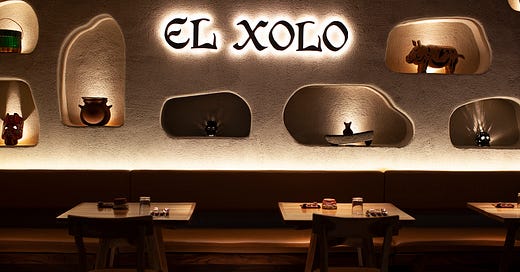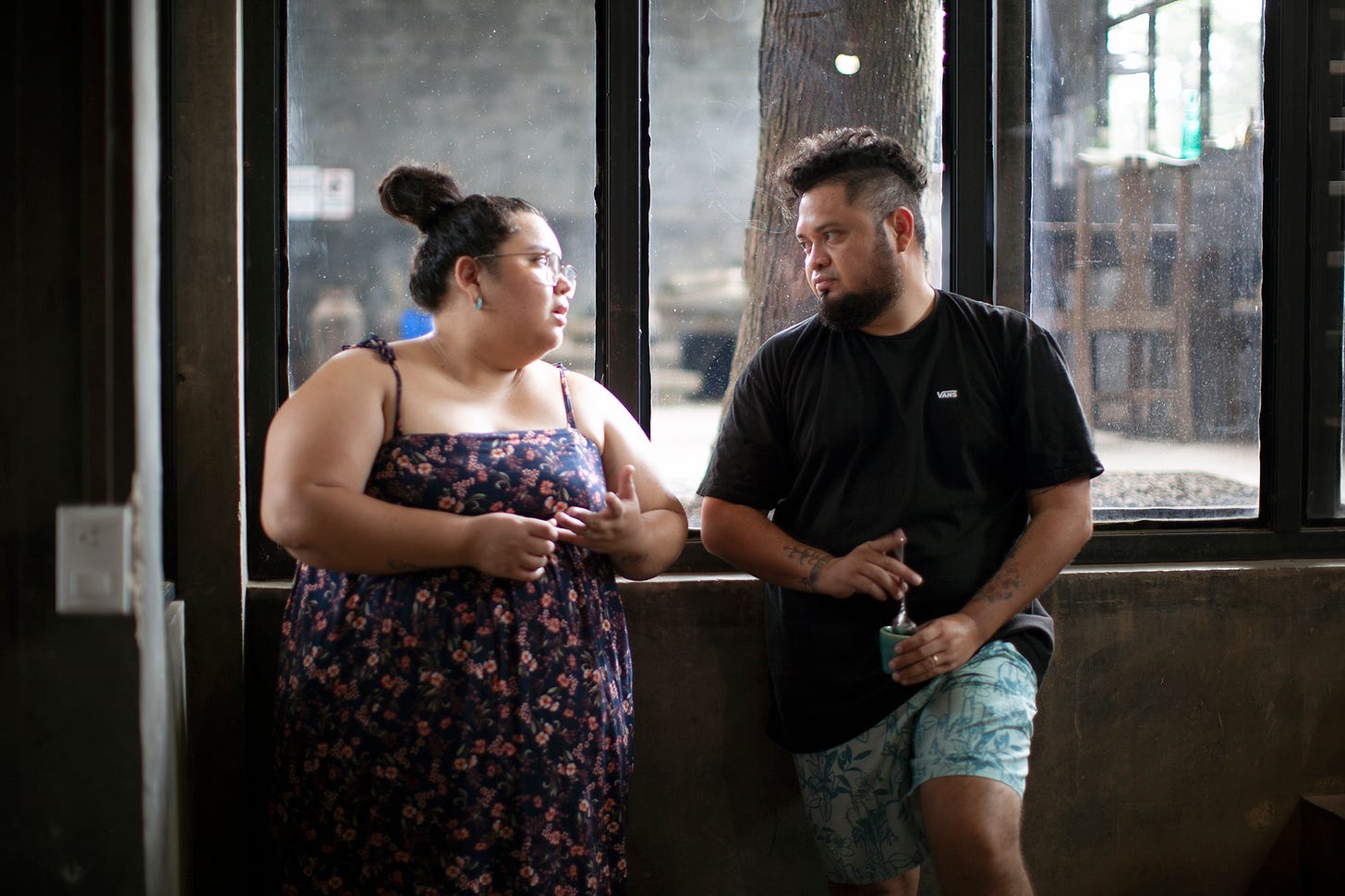El Xolo is the Restaurant El Salvador Needs Right Now
Two cooks from Sonsonate chart a bold path.
This is the second story in a series about El Salvador, a Central American country that is in the midst of major change. You can read the first here.
El Xolo, set within San Salvador’s Museo Nacional de Antropología, is named after Xoloitzcuintle, a 3,500-year-old breed of Meso-american hairless dog. It’s said that the dog protects the living, but it also guides your soul when you die. For Gracia Navarro and Alex Herrera, the name represents rebirth as they’ve died a thousand times on their journey to where they are now.
The two chefs of El Xolo have been hustling together, cooking together since they were kids. Most of their families left Sonsonate, the town in the Western part of El Salvador, where they grew up and moved to the U.S., as has become common in the country. Alex and Gracia stayed for as long as they could. They wanted to get degrees in things like architecture and engineering, but there wasn’t the money. Gradually, they realized how much they liked cooking and when they were around 19, they opened a small comedor together in town. It was just a small kitchen near the market where they made homemade foods like pollo guisado, relleno de guisquisl and chow mein. At night they would make pizzas with dough they made on their own. It was too far from Sonsonate’s market though, so it didn’t last.
Alex grew up in a sketchier part of town where most of his friends were caught up in gangs. Many of them just disappeared. There one day, then never heard from again. He was selling things like produce and gunpowder, while Gracia enrolled in culinary school in San Salvador. She had to wake up at 4am and catch a bus every day. She started competing in culinary competitions and winning them, allowing her to travel and expand her idea about cuisine and Alex kept up with her at every step.
In 2016, they launched a pop-up dinner series, called Raíz. In a country where Pizza Huts and Pollo Camperos dominate the landscape, they wanted to create innovative menus around Salvadoran ingredients like criollo corn and madre de cacao flowers. They were active on social media and held dinners at bars and event spaces, gradually growing a small following. A year later in 2017, they founded Centro America Unida, a loose network of Central American chefs that try to raise the profile of local ingredients and the producers that work with them throughout the region. That’s where I first met them, in 2018.
Everything they had went into Raíz and into a small bakery, then the pandemic happened. They were down to their last $20. They started with the very foundation of Salvadoran ancestral cooking, corn. They started nixtamalizing the landrace corn they bought from small farmers and made tortillas and sold them out of their house. It was their way back, but the corn also gave them new life.
When someone from the anthropology museum approached them and said they were accepting applications to take over the restaurant at the entrance, they applied and after months of deliberations they won the bid. They found partners in patrons of their pop-ups that became friends and wanted to support them and El Xolo formally opened in early 2023. It’s a single dining room and bar beside an open kitchen. The walls are lined with dried corn husks and hanging gourds for lampshades, while a playlist of entirely Salvadoran pop music plays overhead.
They are paying their staff, many who come from impoverished communities, above market rates. They give them good hours and days off. Working in restaurants elsewhere in the city, they had to deal with mistreatment of every sort, from sexual harassment from management to tip stealing, and they won’t permit abuse in any form. They are also encouraging their small producers to grow things they couldn’t sell before more than the top market price.
“I want my own house and nice things, but I want their lives to change too,” says Gracia. “They don’t realize the value they have.”
Their cooking is inspired and taste good. There are no dollops of caviar or chawanmushis to try and do what the rest of the 50 Best crowd are doing. Every dish tells a story, naturally. Nothing is forced. There is pipián and gallina India en crema that evoke memories of Sonsonate, as well as tételas, pastelitos de conejo and a dirty martini with fermented loroco and encurtido water. Tamales come in greens and purples. Some use rice flour. Some are sweet. Everything traces back to somewhere and some moment in time. The stories come because they are real. They don’t have to be forced. El Xolo is not the next Noma or Central. It’s the next El Xolo.
El Salvador is in midst of a gargantuan transformation that will define the direction of the country and everyone who lives there well into the future. Rather than just bearing witness to that change, two cooks from Sonsonate that could have given up long ago are actively trying to dictate the course of that change with whisks and alguashte and they have as much right as anyone else.
Lots of people can cook. They can stage at the best restaurants in Europe. They can work like a monk in Japan. They can get a Bocuse d’Or or a James Beard Award or appear on some list of restaurants or chefs with marketing budgets. However, very few people, regardless of how many places they’ve been and how many important people they know, have a voice. Gracia Navarro and Alex Herrera have a voice and they are using it.





